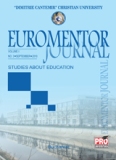WILLIAM JAMES: ON THE BORDER BETWEEN SCIENCES AND RELIGION
WILLIAM JAMES: ON THE BORDER BETWEEN SCIENCES AND RELIGION
Author(s): Mirela RaduSubject(s): Psychology, Epistemology, 19th Century Philosophy, Contemporary Philosophy, Pragmatism, Philosophy of Religion, Health and medicine and law, Sociology of Religion
Published by: Editura Pro Universitaria
Keywords: psychology; empiricism; religion; mysticism; medical studies; epistemology;
Summary/Abstract: "The American philosopher and psychologist William James (1842-1910) is known to the world of medicine for being the first psychologist in his country. But his influence on universal culture was much deeper. Together with the mathematician and philosopher Charles Sanders Peirce (1839-1914) he laid the foundation for pragmatism. James considers the human mind as a dynamic concept. James also contributed to functional psychology by attempting to define the subconscious in relation to the perception of personal existence. His medical studies led him to perceive psychology as a branch of biology. In the book he published only a year before he passed away, The Meaning of Truth (1909), James postulated radical empiricism. According to the American psychologist, human consciousness is a complex process, not just a data flow, but also the creation of networks and connections between these fragments, and human experience is a cumulative, non-random connection process. Numerous philosophers, sociologists, psychologists, logicians, mathematicians, and even literary writers are indebted to William James for his innovative ideas. The multidisciplinarity of this visionary man’s theories is unquestionable. He managed to create a system of thinking which blended all the aspects encountered when studying human mind.”
Journal: Euromentor Journal - Studies about education
- Issue Year: X/2019
- Issue No: 2
- Page Range: 26-38
- Page Count: 13
- Language: English

